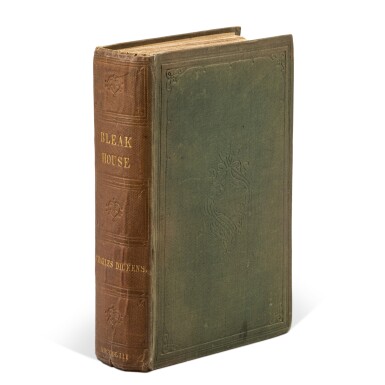
Property from the Workman Collection
Dickens, Charles | The author's commentary on urban environments, with a note from Dickens
No reserve
Lot Closed
July 20, 06:34 PM GMT
Estimate
2,000 - 3,000 USD
Lot Details
Description
Property from the Workman Collection
Dickens, Charles
Bleak House. London: Bradbury and Evans, 1853
8vo (220 x 140 mm). Half-title, engraved frontispiece, engraved additional title–page, 38 illustrations by J.K. Browne (“Phiz”), with the 10 “dark” plates; some foxing to plates, as usual. Publisher's olive green fine-diaper cloth, covers with two line blind-stamped border enclosing rectangular frame with loop-scroll design in each corner and a lineal globe-shaped design at center, spine in blind stamped panels with lettering in gilt, pale yellow endpapers, with autograph manuscript note by Dickens tipped onto the front free endpaper; spine sunned, shelfwear to lower edges and some small loss to foot of spine. Housed in custom green morocco clamshell case.
First edition in book form. A rare binding variant, with a note in Dickens' hand tipped in, reading "Bleak House and The East Wind."
"We thought that, perhaps," said [Esther Summerson], hesitating, "it is right to begin with the obligations of home, sir; and that, perhaps, while those are overlooked and neglected, no other duties can possibly be substituted for them."
"The little Jellybys," said Richard, coming to [her] relief, "are really—I can't help expressing myself strongly, sir—in a devil of a state."
"She means well," said Mr. Jarndyce hastily. "The wind's in the east."
"It was in the north, sir, as we came down," observed Richard.
"My dear Rick," said Mr. Jarndyce, poking the fire, "I'll take an oath it's either in the east or going to be. I am always conscious of an uncomfortable sensation now and then when the wind is blowing in the east."
The wind blowing in the east is a constant point of reference for Mr. John Jarndyce, one of the novel's central characters, and a beacon of social good. As above, he deploys the phrase when his world is threated by disorder, or when he witnesses broader injustices. Easterly winds, after all, were believed to carry dirt and disease, and were considered a real threat in Victorian Britain. Given the novel's preoccupation with physical environments, and how these relate to individual and public health, this small comments is, in fact, incredibly charged with meaning.
Dickens (who some have argued modeled John Jarndyce after himself) in addition to being a prolific novelist, was one of the greatest social reformers of his day. On May 10th 1851, as he was planning Bleak House, he delivered the anniversary speech for London's Metropolitan Sanitation Association. Addressing the assembly, Dickens began: "That no one can estimate the amount of mischief which is grown in dirt; that no one can say, here it stops, or there it stops, either in its physical or moral results, when both begin in the cradle and are not at rest in the obscene grave [hear, hear], is now as certain as it is that the air from Gin Lane will be carried, when the wind is Easterly, into May Fair, and that if you once have a vigorous pestilence raging furiously in Saint Giles, no mortal list of Lady Patroness can keep it out of Almack’s. [Hear, hear]" (Dickens "Metropolitan Sanitary Association"). While Bleak House suggests an undeniable link between the direction of the wind and spread of disease, here, a year before the first installment of the novel was issued, it is clearly articulated. Significantly, Dickens is also citing a connection between physical and moral climates, as well as between pollution and contagion. It would seem that for the author, no corner of London was safe until it was made clean.
A rare copy of one of Dickens' most important novels.
REFERENCE:
Dickens, "Metropolitan Sanitary Association, 10 May 1851," The Speeches of Charles Dickens, ed. by K.J. Fielding (Oxford: Clarendon Press, 1960), pp. 127-132, (pp. 128-29); Dickens, Bleak House (London: Bradbury and Evans, 1853), 1; Eckel 64–66; Gimbel A154; Smith I:10, Sadleir 682
PROVENANCE:
John Howard Galton (bookplate to front pastedown) — Eric S. Quayle (bookplate to front pastedown)
You May Also Like










